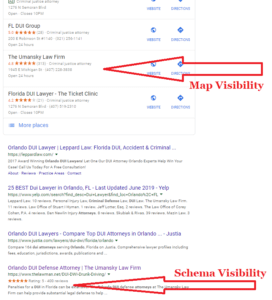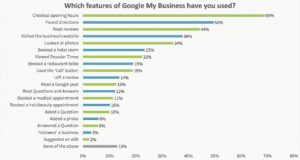We’re halfway through 2019 and it’s becoming crystal clear that having stellar reviews is crucial to a business’s success. If you’ve read some of our blogs on review generation or joined in on one of our popular webinars on how to obtain them, we’ve gained significant insight on this subject. We also know that our clients and other businesses with 5-star reviews aren’t just generating more, higher-quality leads, but they are also starting to dominate their markets through their reviews. Today we’re talking about the top 7 main ways businesses with great reviews are beating their competition every day.
1. Potential Clients are Finding their Great Reviews on Popular Review Sites
How often are people verifying the reputation of a business before working with them? Absolutely always! The average consumer will visit a website and read about the company, and then Google the brand afterward to read more about other peoples’ experiences and reviews. 80% of consumers state that they use some social verification about a business before making the decision to contact them and/or use their products or services.
2. Potential Clients are Seeing their Great Reviews on Their Websites
A great UX component websites have nowadays is featuring quality reviews. Websites that feature dozens to hundreds of stellar reviews, typically above the fold, have a much greater impact on visitors than those that do not feature any reviews. Elements that are proven to grab the attention of visitors to a website that offers services are awards, accolades, testimonials, business overview videos, and reviews.
3. High-Quality Reviews Open Up Exclusive Awards, Accolades, and Badges
Speaking of awards, accolades, and badges, many times these can only be available for businesses to use when they acquire a high number of positive reviews. For lawyers, Avvo’s coveted Excellent is only distributed after acquiring many reviews. Wedding vendors have “Best of” from Wedding Wire and the Knot. Contractors get special recognition on HomeAdvisor and Angie’s List after great feedback. You get the picture! These badges, often contingent on reviews, are featured prominently with the rest of a business’s social validation, further putting them in an impactful, positive light.
4. The More Reviews, the More Testimonials and Review Excerpts You Can Use
Almost every positive review comes with a positive testimonial. Have you ever gone to a business’s website and, in addition to a few select testimonial excerpts on the homepage, seen an entire page dedicated to testimonials? Consumers and potential clients who visit a dedicated testimonials page and scroll through to see dozens, if not hundreds, of stellar testimonials are going to easily consider that business as a serious choice.
5. Reviews Add More to Business Visibility and Components of SEO
If you’re familiar with some schema markup for websites and Google My Business, you’ll see that reviews also find their way into enhanced visibility and placement in search results. Here are the examples I’m talking about:
The schema visibility dramatically increases the click-through rate of an organic listing – even if this particular result is fourth, even with results 1-3 at better positioning and higher brand awareness, that particular position will do very well and possibly better due to the schema review markup acquired with review generation. In the Map Pack, there is a strong correlation between the number of positive reviews of a listing and the business’s position on GMB. In the example, the fourth result ranked highly for “Orlando DUI lawyer” even though the firm isn’t particularly close to Orlando’s city center.
6. Did We Say there is a Strong Correlation Between Great Reviews and Positioning on Google My Business?
We’ve been following Moz’s excellent breakdowns of Local Search Ranking Factors year after year for about 5 years, and in 2019, review signals found itself as the overall #3 factor. You can see that article here:
https://moz.com/local-search-ranking-factors
Keep in mind that review signals only a couple of years ago were as far down as #10, so as social validation becomes increasingly valuable to consumers, Google continues to factor that into all of the aspects of its algorithm, from your standard organic search results to actual placement on maps that used to rely heavier on proximity and authority in previous years. If your competition is doing well, they likely have a proactive plan for review generation in place, among other marketing initiatives.
7. Reviews Have a Future of Higher and Higher Leverage
We’ve talked about the future of Google My Business paid features, and this is in addition to the paid ads that can commonly be featured in the map pack – reviews are going to be leveraged to an even higher extent in upcoming months, and businesses with a review plan are going to pay the marginal fee to take advantage of that. Let’s look briefly at how people currently use GMB:
Source: https://searchengineland.com/should-we-be-paying-for-google-my-business-features-316602
44% of people reading reviews is a significant number, along with a click-through into the website, which is more likely to happen if you’re featured prominently on GMB for your respective keywords to begin with! Google conducted a survey of the potential additional monetized features they’d like to roll out, and here are the ones that factor in reviews the most:
- Verified Customer Reviews – Google will verify the customer reviews to ensure they are reviews of people that 100% used your product or service
- Automated Responses for Review – You can pre-load canned responses to reviews of certain rating to quickly provide engagement if you can’t be as proactive with review responsiveness
- Featured Review Placement – You will be able to feature reviews of your preference, typically the ones with the most praise
Among some other possible GMB features that Google is featuring (all via a survey they conducted a couple of months back) that would have a huge impact are:
- Promoted Map Pin – Perhaps not necessary if you already positioned well
- Instant/Request a Quote
- Display video on profile
These products are not set in stone but based on the direction Google has been going in, there’s almost no doubt that many of these features will be available for a fee as soon as late 2019.
Show Off Your Stars
If you’re looking to generate more 5-star reviews and knock the competition, you can get them more quickly and effectively with the help of a digital marketing service that goes above and beyond. At Market My Market, we’ve become experts at review generation and online reputation management. So, if you ever get the unsightly 3-star review (or lower), we can help you push it out of the way. Find out how with a free marketing consultation.

The ongoing digital revolution is transforming the way that all businesses interact with clients and customers. Consumers rely heavily on digital channels for researching products and services and expect to make buying choices with the swipe of a finger. For organizations that want to remain competitive, having a defined digital marketing strategy and execution plan is essential for successful outcomes. With a demonstrated history of creating and implementing strategic digital marketing initiatives that drive growth, I am committed to delivering real, measurable results for my clients.


